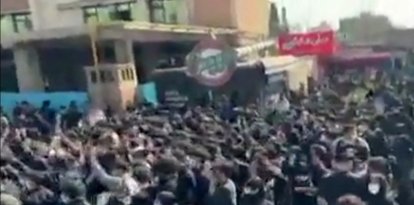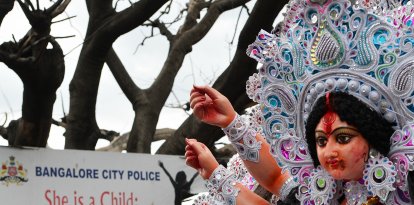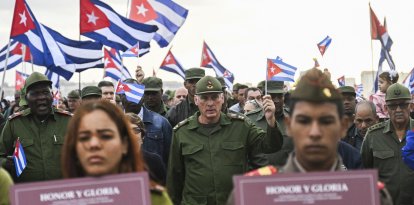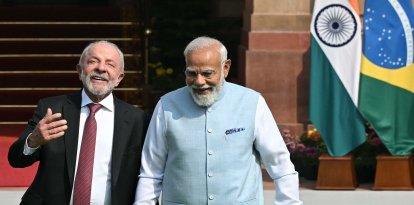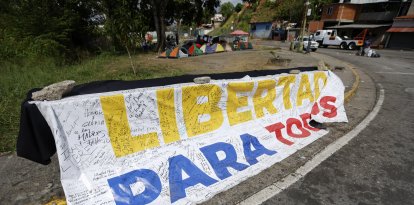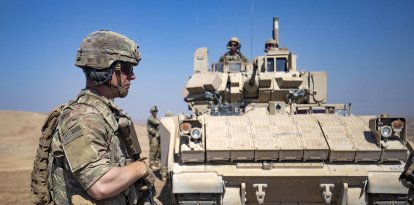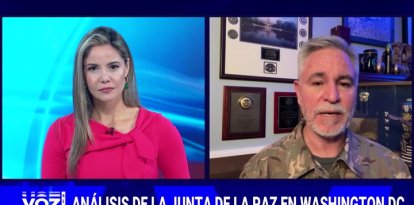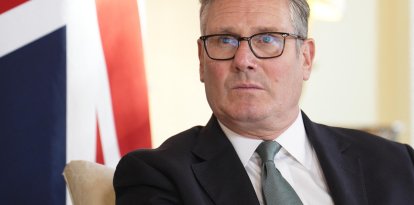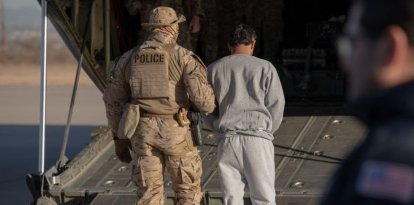Why are opposition primaries in Venezuela so important?
The Venezuelan opposition renewed its leadership thanks to free primaries, in which more than 2 million people participated.
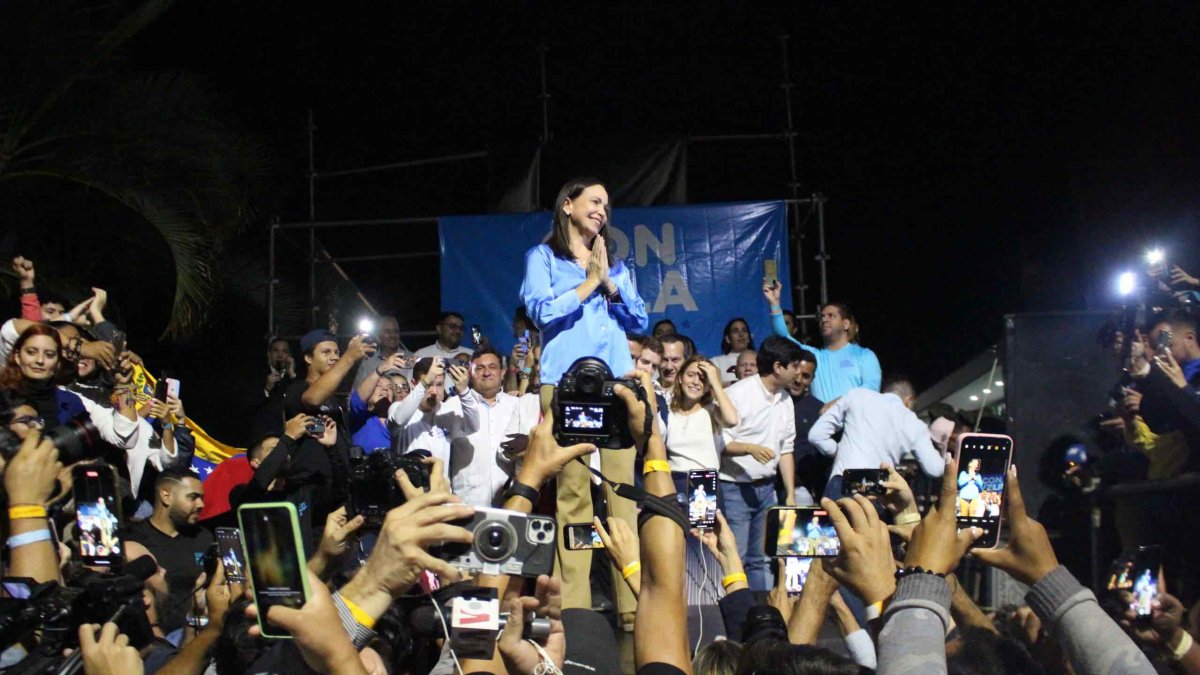
(María Corina Machado da un discurso luego de su triunfo en las primarias de la oposición venezolana. Foto de Vente Venezuela).
On Sunday, Oct. 22, more than 2 million Venezuelans both inside and outside the country participated in the opposition primaries to elect their leader against Nicolás Maduro's tyrannical regime. María Corina Machado, Venezuela's only center-right leader, won with more than 90%.
The numbers far exceeded expectations. Before the primaries, many thought that they would not happen and that, if they did, turnout would be low. Now, the primaries have become a milestone in recent years, with consequences beyond the election of a candidate to face Maduro in the presidential elections that are scheduled for 2024.
Why are opposition primaries so important? Why, in a country governed for more than 20 years by one of the most ruthless authoritarian regimes in the world, is a civic event like the primaries so decisive?
Here, we explain it to you:
The challenges
Before the primaries, María Corina Machado, who was one of the most prominent leaders of the Venezuelan opposition, had already proposed that Venezuelans elect their leadership through an autonomous election process.
Then, at the beginning of this year, the National Primary Commission was created to formally organize the process of electing the opposition candidate to face Maduro in the 2024 presidential elections. At first, there was not much certainty about what the primaries would be like, and the commission (and Machado's wing) faced several challenges.
- The National Electoral Council (CNE), the body of the regime that organizes elections in Venezuela, sought to prevail to coordinate the primaries. Within the same commission, there were forces and pressures for the primaries to be organized by the CNE. Other voices on the commission opposed it, arguing that the CNE would take away the freedom and autonomy of the process. María Corina Machado's wing also opposed and fought from day one so that the primaries were not organized by the National Electoral Council. Finally, despite threats and obstacles, they achieved it.
- María Corina Machado, who always stood out as the candidate with the most strength and support, was disqualified by Maduro. Even some politicians connected to the regime condemned her before the dictatorship's court, and Machado was threatened with imprisonment for insisting on participating in the primaries. Also, some supposedly opposition parties that were competing in the primaries began to promote the idea that Machado should not compete in the process, as she was disqualified. Consequently, many voices, even within the opposition, said that Machado should appoint a substitute or successor if she won the primaries. Machado said that giving in to disqualification was allowing the regime to choose its opponents through an arbitrary measure. Machado insisted, ended up participating and ultimately won the primaries.
- Machado won with a historic margin in the opposition primaries largely due to the lack of credibility that many opposition parties have among Venezuelans. These same parties tried to sabotage the primaries. Henrique Capriles Radonski, once one of the most recognized opposition leaders, was one of those who mainly opposed Machado's participation. In the end, Capriles decided to withdraw shortly after the primaries. Democratic Action, a historic Venezuelan party, also sought to sabotage the primaries. Although its candidate, Carlos Prosperi, did not withdraw, he claimed the elections were manipulated and refused to recognize Machado's victory.
- The National Primary Commission, made up of academics rather than experienced politicians, stood firm despite threats and pressure. First, from within the same commission, other members tried to submit the primaries to the National Electoral Council. For example, María Carolina Uzcátegui, who was a member of the commission, insisted that the regime must organize the process. Since she could not prevent it from being autonomous, she decided to resign and, from the outside, sought to sabotage the election, alleging there were irregularities. Diosdado Cabello, Chavismo's number two and accused of narcoterrorism by the United States, threatened the members of the commission on several occasions and accused them of corruption. Also, members and volunteers of the commission throughout the country received threats and pressure. Many resigned, even a few hours before the primaries. Jesús María Casal, the president of the commission, and other members such as the academic Corina Yoris, stood firm and finally managed to make the primaries happen. Due to threats and pressure, voting centers ended up being the homes of some volunteers in some cities in the country.
- To participate in the primaries, Venezuelans both inside and outside the country had to be registered in the electoral registry in order to guarantee the credibility of the process. For several years, the regime has not allowed Venezuelans to register to vote, which is why millions of young people over 18 years of age were not able to participate. Abroad, there were voting centers in the cities with the greatest presence of Venezuelans; however, in many cities around the world, it was impossible to install a voting center. Considering that there are more than 7 million Venezuelans in exile, the population that emigrated is essential for an election.
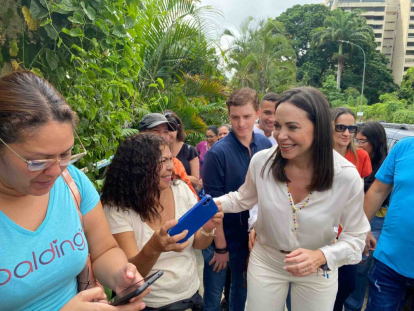
(María Corina Machado going to participate in the opposition primaries).
María Corina Machado greeting voters participating in the opposition primaries. (Vente Venezuela)
Why were these primaries a milestone?
Once the commission published the first bulletin, late on Sunday night, it was clear that María Corina Machado had received the overwhelming support of Venezuelans. Although there are still no absolute results, with the total votes counted, the projection is that more than 2 million Venezuelans -- that is, more than 90% of those who participated -- supported Machado. This makes her the main leader of the Venezuelan opposition with support that an opponent has not had in the last 24 years of Chavismo.
What to consider:
- The last opposition primaries in Venezuela were in 2012, when Venezuelans chose the opponent against Chávez in the presidential elections of that year. So, with millions more voters and without a significant diaspora like today, over 3 million people voted. Henrique Capriles Radonski was the winner of that process with just under 2 million votes. That is to say, even with fewer people participating, Machado received greater support than did Capriles. It is important to mention regarding the 2012 primaries: a.) the National Electoral Council participated and organized them; b.) all opposition parties supported them; c.) no one received threats and, d.) no candidate was disqualified.
- María Corina Machado clarified throughout her primary campaign that she was not simply a candidate for the elections in 2024. By voting for her, Venezuelans not only elected an electoral representative but also renewed the leadership of the opposition.
- Many so-called opposition parties, who have little credibility, managed to keep their candidates and agendas afloat for more than 20 years. Manuel Rosales, Henrique Capriles, Leopoldo López and Juan Guaidó were part of this political establishment. It is the first time in the era of Chavismo that the Venezuelan opposition will be led by an outsider, who on several occasions distanced herself from the strategies and positions of the main political parties.
- The regime has reacted aggressively against the result of the primaries, thus demonstrating how uncomfortable the process was for them. Jorge Rodríguez, one of the most important voices of Chavismo, accused the commission of committing a crime for organizing the primaries and requested prison time for its members. So did Cilia Flores, Maduro's wife, who rarely appears in public. Diosdado Cabello, Chavismo's No. 2, also threatened the commission and said that it is impossible for Machado to be authorized and participate in the 2024 elections.
- Machado has received international support like few Venezuelan opponents. Senator Marco Rubio congratulated her, as did Tim Kaine and Bill Cassidy. A group of former presidents of Latin America, members of the IDEA Group, sent her a letter of support. Former President Iván Duque did the same, as did Nobel Prize winner Mario Vargas Llosa.
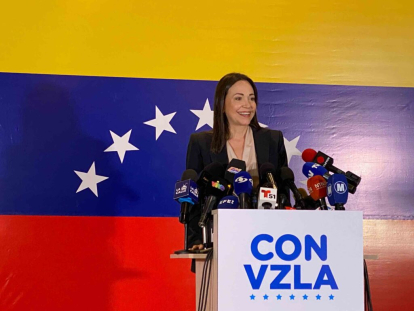
(María Corina Machado at a press conference this Tuesday, October 24, regarding the results of the opposition primaries).
María Corina Machado at a press conference this Tuesday, Oct. 24, regarding the results of the opposition primaries. (Vente Venezuela)
In short, the primaries were a milestone as a civic effort and for their potential consequences. As it was a process organized behind the backs of tyranny, Venezuelans sent a clear message. Participation in previous false elections was condemned because they legitimized the Chavista system. This is not the case of the primaries, because they were organized autonomously and freely. But, beyond this, the fact that the opposition can renew its leadership in an event that gives so much legitimacy to a new leader is substantial. Now, the dialogue with the international community, mainly the United States, must go through María Corina Machado and not through the rest of the Venezuelan opposition—criticized on several occasions as being complacent and docile in the face of tyranny.
The challenge that Machado and the Venezuelans face is gigantic. Now, the new opposition leadership must try to foster conditions so that, if there are presidential elections, they are truly competitive. Although it is unlikely, if Machado manages to coordinate a domestic and external force, she will be able to set her own conditions little by little. This, of course, will be very difficult and very dangerous.













